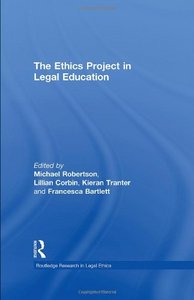Towards ethical literacy by enhancing reflexivity in law students
Crowley-Cyr, Lynda (2011) Towards ethical literacy by enhancing reflexivity in law students. In: Robertson, Michael, Corbin, Lillian, Tranter, Kieran, and Bartlett, Francesca, (eds.) The Ethics Project in Legal Education. Routledge, London, pp. 142-170.
![[img]](https://researchonline.jcu.edu.au/15958/1.hassmallThumbnailVersion/15958_Crowley-Cyr_2010_Book_Cover.jpg)
|
Image (JPEG) (Book Cover)
- Cover Image
Download (17kB) |
|
|
PDF (Published Version)
- Published Version
Restricted to Repository staff only |
Abstract
Legal ethics is typically taught as part of the undergraduate law degree in Australia. In this chapter, I share why I do what I do: the theories that inform my classroom practice, and my experiences in teaching legal ethics at James Cook University in North Queensland. The teaching approach I have developed aims to better equip students to become reflexive, ethically literate professionals. Other teachers who may be seeking an approach to engaging students in a more authentic adult learning experience may find my reflections useful.
My core proposition is that legal education in general does not adequately prepare students for the pressures of legal practice. Today's practising lawyers must manage a seemingly irreconcilable tension between making a profit and providing ethically and technically appropriate professional service. Meanwhile, phenomena such as mental ill-health, substance abuse and apparent ethical blindness to or complicity in unethical conduct suggest a deficit in lawyers 'reflexive capacity'. Such wider moral and ethical questions - which, as Giddens says, 'day-to-day life poses but which are denied answers' - form a key part of my teaching process. In my experience, teaching legal ethics must include more than dictating professional rules and interpretive case law for students to memorize and regurgitate. Knowledge of the ethical rules associated with practising law is a requirement for admission as a legal practitioner in Australia. However, this knowledge alone does not provide students with the necessary tools to engage the moral self with the professional rules. The premise upon which reflexive ethical literacy is grounded is that law schools have a public duty to educate future professionals who have internalized an autonomous capacity to apply ethics in the practice of law.
Traditional law school curricula emphasizes critical analysis of law and society. This preoccupation with the cognitive domain, however, means that students who have almost completed their law degrees may have had little opportunity to rigorously scrutinize their personal values or their knowledge of the values of the legal profession. In an atttempt to address this lack, my approach to teaching legal ethics is embedded in the scholarship of modernity, critical literacy and adult education. It is influenced by clinical educators of various disciplines to provide an inter-professssional knowledge base.
This chapter is presented in three parts. The first section discusses theories of modernity that help explain changes in the legal profession that impact on the ethical practice of law and the emotional and mental state of lawyers. Recent findings about similar problems experienced by graduating law students support my proposition that a teaching approach that enhances students' reflexive capacity is critical to enabling them to identify and manage ethical challenges. Emotional intelligence and moral courage are also paramount in enabling students to become more aware of how they (and the communities to which they belong, past and present) are engaged in an ongoing process of identity-construction.
The second part of the chapter briefly discusses some of the assumptions and shortcomings of pedagogy and andragogy in legal education in terms of preparing students for ethical practice. My goal is to build a bridge between what is an essentially pedagogical approach to curriculum and an andragogical one embedded in reflexivity. This 'hybrid', combining pedagogy and andragogy, is one way of assisting students to make the transition from university to professional life. Andragogical ideas, theories and methods for adult education, developed notably by Knowles and Freire, have specific benefits for teaching legal ethics. The students who take my subject are typically adults, and a robust literature establishes that adults learn in a manner qualitatively different from that which suits pre-adult students.
The third section turns to the curriculum design of my legal ethics subject, and provides some reflections on the reflexive andragogic approach that I have taken. Some of the responses from students who have taken my subject, past and present, are included.
| Item ID: | 15958 |
|---|---|
| Item Type: | Book Chapter (Research - B1) |
| ISBN: | 978-0-415-54651-5 |
| Keywords: | ethics, ethical literacy |
| Date Deposited: | 11 May 2011 05:51 |
| FoR Codes: | 18 LAW AND LEGAL STUDIES > 1801 Law > 180199 Law not elsewhere classified @ 100% |
| SEO Codes: | 94 LAW, POLITICS AND COMMUNITY SERVICES > 9499 Other Law, Politics and Community Services > 949999 Law, Politics and Community Services not elsewhere classified @ 100% |
| Downloads: |
Total: 1189 Last 12 Months: 5 |
| More Statistics |



